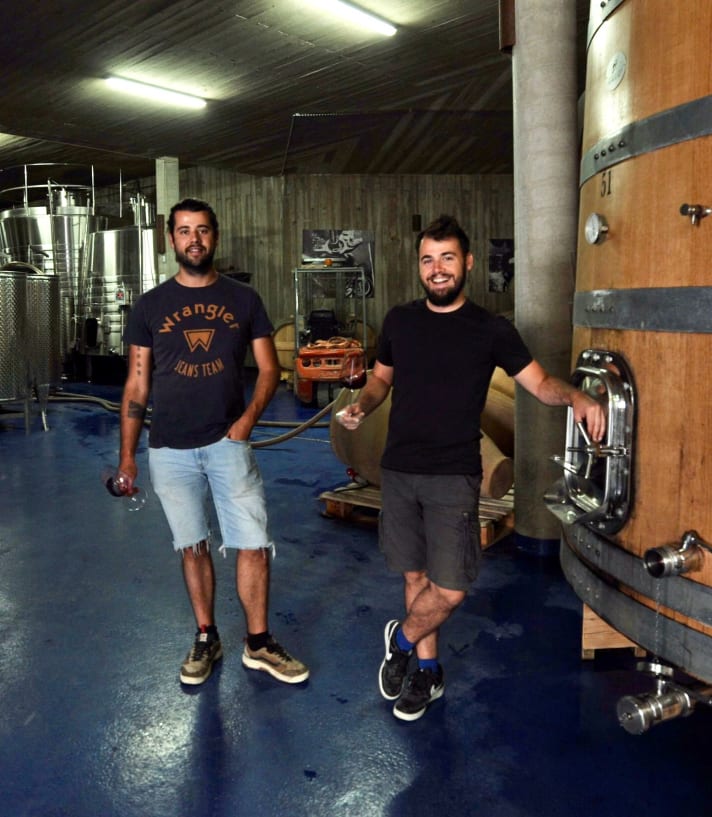Why did Cerrón choose to make wine in Jumilla?
It was not a matter of choice; my family has been rooted for generations in a quaint town within the AOP Jumilla, known as Fuente-Álamo. We are three siblings who have inherited the legacy as the fourth generation representing the Bodega Cerrón brand. The climate in this region is challenging, with vineyards situated between 800 and 1000 meters in altitude, experiencing harsh winters and summers characterized by long days, diurnal heat, and nocturnal cold. These conditions contribute to grapes with significant concentration, yet retaining both energy and lightness.
The calcareous soils, marked by an active limestone concentration at the limit of vine cultivation, add a distinct character to our wines. Our vineyards carry a generational tale, with some vines dating back to 1911 and others to 1967. We are actively involved in strategic planting, selecting the best soils in the town to ensure the creation of vineyards that can evolve into distinguished wines, coveted by discerning consumers and intended to be passed down to future generations.

What makes Jumilla a great winemaking region?
Jumilla is an extensive Designation of Origin, much like Rioja and many other regions in Spain. Its landscapes and soils are highly diverse, with vineyards ranging from 300 meters above sea level to 1000. Our town is situated to the north of the Jumilla PDO, in the area with the highest average altitude, with vineyards spanning from 800 to 1000 meters with different orientations and types of limestone soils.
Geologically, the region is quite varied, a result of tectonic collision between two mountain systems: the Prebetic Mountain Range and the Iberian System. This collision exposed strata dating back 150-240 million years, when the Iberian Peninsula was partially submerged by the Tethys Sea. The limestone soils we cultivate our vines on were formed from this ancient sea.
These soils, with high calcium carbonate content, gives a marked salinity and a limestone tannin to our wines, providing a refreshing quality and a lot of energy. Planting at nearly 1000 meters altitude on sloping terrain and in low-yield soils involves a great deal of manual vineyard work, which increases production costs. At Bodega Cerrón, we follow environmentally respectful practices by producing biodynamic wines certified by Demeter.
Why have you chosen to plant vines where you have?
We hold a significant heritage of old vines, planted with "Pie Franco" (ungrafted) from 1911 to 1967 in the most qualitative areas of our town. Nevertheless, we believe that our current perspective on world-class wine is broad, and we plant with a solid understanding of the type of wine we aim to create. We believe that the finest wines from Bodega Cerrón are yet to come, and we have confidence that the vines we are currently planting will produce high quality wines in the near future.
Our approach involves seeking elevated areas with north-facing slopes, limestone soils, and using massal selection from our best vines. We are committed to a vision of crafting exceptional wines, and we believe that the combination of strategic planting and a deep knowledge of winemaking will contribute to the realization of this vision.

Challenge any misconceptions from the region
Climate change poses a significant challenge for the future. While it's true that we have experienced years with higher than usual rainfall, it's also a fact that the rain is unevenly distributed throughout the year and often falls during the vegetative period of the vine, leading to an increased risk of diseases. Working in biodynamics, we only apply natural preparations to our vineyards, which requires constant attention and careful management of the vineyard's needs.
Jumilla is commonly perceived by the public as a warm region, but it is, in fact, an extensive area on the Mediterranean plateau with hills ranging from 1000 to 1350 meters. The elevation moderates the heat and creates a significant temperature difference between day and night, extending the ripening period while preserving the natural freshness of the grapes. This altitude-driven thermal amplitude is crucial in maintaining the balance and quality of our vineyards.

How do your winemaking methods elevate what is there naturally?
We strongly believe that excellence in wines is achieved only from exceptional vineyards managed with careful and environmentally friendly viticulture. To show the tipicity of the landscape of our town, we focus on cultivating grapes with intrinsic freshness and the salinity characteristic of limestone soils. To achieve this desired profile, we enrich our vineyards with abundant composted organic matter produced locally in our goat herd, also certified in biodynamics.
The resulting grapes exhibit lower pH levels and higher acidity than normal, allowing us to conduct the winemaking process naturally in the cellar. We always work with spontaneous fermentations and avoid the use of sulfites both during fermentation and aging. The barrels used are made of neutral wood, preserving the distinctive character of our terroir at every stage of the process, from the vineyard to the glass.
Why should you have wines from Jumilla wine on your list?
It is a geologically diverse region with marine strata formed 150-250 million years ago, imparting a unique character to wines from producers who care for their vineyards. The limestone terroir, combined with high-altitude vineyards, produce gastronomic wines with acidity and salinity that “wake up" the consumer's palate, encouraging a greater enjoyment of dishes.

